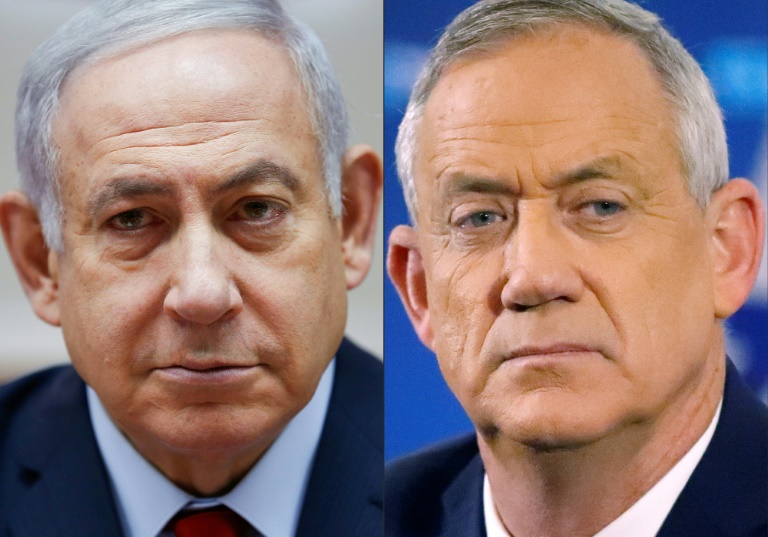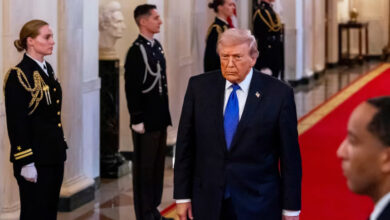
Israel began voting in its second election in five months Tuesday that will decide whether to extend Prime Minister Benjamin Netanyahu’s term as the country’s longest-serving prime minister despite corruption allegations against him.
Polls opened at 7:00 am (0400 GMT) and were due to close in most areas at 10:00 pm.
At one Jerusalem polling station, a trickle of voters arrived just after it opened.
“I think Bibi needs to go,” said Gruny Tzivin, a 37-year-old teacher, using Netanyahu’s nickname.
“After so many years it is time for a change and I think it fits with what I believe in for this country.”
The stakes could not be much higher for the 69-year-old right-wing leader who, as in April polls, faces a strong challenge from ex-military chief Benny Gantz and his centrist Blue and White alliance.
Ex-defence minister Avigdor Lieberman, Netanyahu’s former right-hand man turned rival, could play a kingmaker role with his campaign to “make Israel normal again.”
Some 6.4 million people are eligible to vote.
The first exit surveys will be released just after polls close, while official results are not expected until Wednesday.
Opinion polls have indicated another tight race, showing Netanyahu’s Likud and Blue and White winning around 32 seats each in the 120-seat parliament.
Both Netanyahu and Gantz paid a last-minute visit Monday night to Jerusalem’s Western Wall, the holiest site where Jews are allowed to pray.
Immunity?
Netanyahu enters the election after having suffered one of the biggest defeats of his political career following the April vote.
His Likud along with its right-wing and religious allies won a majority, leading Israeli President Reuven Rivlin to task the premier with forming a new government.
But following weeks of discussions, Netanyahu failed, leading him to opt for an unprecedented second election rather than risk having Rivlin choose someone else.
The danger for Netanyahu extends beyond remaining prime minister, a post he has held for a total of more than 13 years.
If he wins, many believe he will seek to have parliament grant him immunity from prosecution while facing the possibility of a corruption indictment in the weeks ahead.
Recognizing the stakes, Netanyahu spent the final days of the campaign seeking to appeal to right-wing nationalists — key to his re-election bid — and to boost turnout among his base.
Those efforts have included a controversial pledge to annex the Jordan Valley, which makes up a third of the occupied West Bank.
He has issued unfounded warnings that the vote could be stolen by fraud in Arab communities, leading critics to accuse him of racism.
But Netanyahu has also highlighted the country’s growing economy and his relationships with world leaders such as US President Donald Trump.
He has tried to label his main opponents “weak” and “leftist” despite their security credentials.
“This is the choice that is open to you: their left-wing government or a strong right-wing government led by me,” he said on Monday.
‘Rude lies’
Gantz has campaigned by presenting himself as an honourable alternative.
He has repeatedly spoken of Netanyahu’s willingness to form a coalition with far-right parties that could help him secure immunity.
Gantz says his alliance, which includes three former armed forces chiefs of staff, wants a unity government that the vast majority of Israelis would support.
“Netanyahu continues to spread rude lies in a desperate attempt to save his government,” Gantz said Monday. “He lies, scolds, skewers, divides.”
Opinion polls show the campaign by Lieberman’s nationalist Yisrael Beitenu party has resonated with voters.
His “make Israel normal again” slogan refers to what the staunch secularist says is the undue influence of ultra-Orthodox Jewish parties on the country’s politics.
He accuses them of seeking to impose Jewish religious law on Israel’s secular population and wants legislation ending the exemption of the ultra-Orthodox from mandatory military service.
Lieberman prevented Netanyahu from forming a coalition after April polls by refusing to relent on his demand that the ultra-Orthodox be required to serve in the military like all other Israelis.
It is not clear he will endorse Netanyahu as prime minister again, which could be enough for Rivlin to allow Gantz to try to form a government.
Israel’s newly reunified Arab parties could also prove decisive with a performance similar to 2015 elections, when they became the third-largest force in parliament.
If so, they could block Netanyahu from continuing as prime minister by recommending Gantz.
Image: AFP / Oded Balilty, JACK GUEZ Israeli Prime Minister Benjamin Netanyahu (L) faces a strong challenge from retired general Benny Gantz and his Blue and White alliance in Tuesday’s polls




